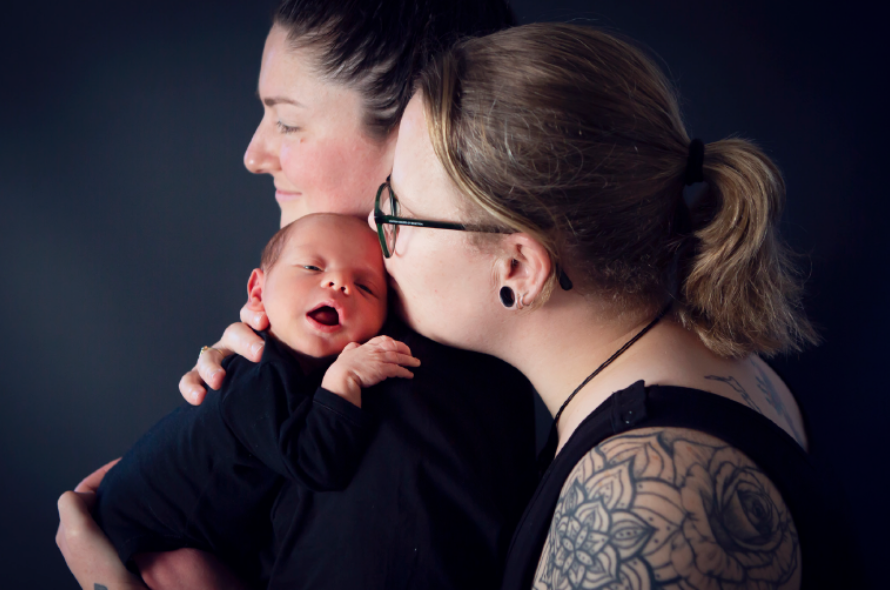
I thought I would be over the moon to be pregnant, but I think there is something wrong with me. I am worried all the time, I am so scared I won’t be a good mum, or that I won’t love my baby as much as my partner will or that something horrible will happen at the birth. I find myself crying on and off through the day – and I am not usually a weepy person. I don’t want to tell my partner how I feel because he is so happy, and I can’t confide in my family or friends because they know how much we wanted this baby. I know I should be loving this pregnancy, but all I feel is anxious…
Pregnancy can be difficult for some couples. There can be so many different emotions associated with this journey long before the pregnancy test is positive. And when those magic lines finally do appear on the pregnancy test, they can set off an avalanche of even more emotions; excitement, anticipation, disappointment, panic and delight are common reactions. That snowball can get bigger and roll faster as birth approaches. There is a lot to take in and your body is coping with all sorts of hormone surges. It is no wonder expectant parents can be overwhelmed with so many different emotions – though strangely we are still hesitant as a society to talk about them.
Anxiety is the topic of this article. Some anxiety during pregnancy is normal, but for 15–35% of expecting mums, symptoms are severe enough to impact on day-to-day lives.
It could be anxiety about your health or your baby’s health, fears about the birth, recurrent thoughts and fears of things that could happen to you or baby, worries about your impending lifestyle change and finances, or the feeling you are not fit to be a good parent. You could also have physical symptoms such as a racing heart, breathlessness, dizziness or difficulties sleeping. Although a range of emotions are very normal during pregnancy, it is important to seek support if you are excessively worried. You might be surprised by how many other women experience the same sort of emotions as you. Talking to others in similar situations can be very useful.
You might find that your partner has anxieties too and is hesitant to mention it for the same reasons that you don’t want to share your feelings – so making the first step can really pay off there.
All the thinking you are doing is proof that you are preparing yourself for being the best parent you can be for your baby.
Why does anxiety matter?
Research shows that the emotional state of the pregnant mother might affect her unborn child. Maternal stress and anxiety during pregnancy can have both immediate and long-term effects on her fetus.
How does this work?
When we are stressed, a series of chemical changes is set off in our bodies and brains, such as the release of cortisol and adrenaline. Normally, these chemicals help prepare us for danger and are important for our survival. However, if we are chronically stressed and anxious, these stress-related hormones can remain high for too long and create havoc in our bodies. When a pregnant woman is chronically stressed or anxious, the baby may be exposed to unhealthy levels of stress hormones, which can at times impact the baby’s brain development.
Chronic or extreme maternal stress may also cause changes in the blood flow to the baby, making it difficult to carry oxygen and other important nutrients to the baby’s developing organs. Chronically stressed mothers may feel overwhelmed and fatigued which might impact their diet and sleep habits and consistency of prenatal care.
What will help?
Most importantly, self-awareness and talking about your feelings. Take an honest look at yourself and how much you have on your plate. How much of your day and especially time when you are not occupied do you spend worrying? Reading about or talking to others about their experiences can be helpful, and talking to health professionals like your midwife, GP, CBE or Plunketline can also be helpful.
Research shows that one important factor influencing maternal anxiety is the mother’s level of social support. Take time to look for other expecting mums that share your values, and invest time in your friendship. Other protective factors may include consistent prenatal care, regular light exercise, adequate rest, healthy eating habits, as well as avoiding alcohol, tobacco, and other drugs.
If you are used to caring for others rather than yourself, making yourself a priority may seem unnatural or even selfish. But taking care of yourself is an essential part of taking care of your baby. Cutting down on stress – or learning how to manage it – makes for a healthier pregnancy and many times a more settled baby in the future.
You could start by sharing your fears with your partner – even if they are about them. Chances are they are harbouring concerns of their own. Communicating openly about your anxiety can help you both feel better. Turn to friends or family members for support, too. Other mothers-to-be can be another source of support, as they are probably experiencing similar worries themselves.
And if you find you are still extremely anxious or have a specific reason to be concerned about your baby’s health, make sure you talk to your midwife or GP who will know about support services in your community. There are professionals who can support you through this time – counsellors, psychologists, support groups, and maternal mental health teams are skilled at helping women at this vulnerable time. They are trained to be a confidential, knowledgeable, and non-judgemental source of support, and you do not have to worry about unloading your anxieties with them. But you have to reach out to them, that is the first step. If you feel you can’t do it for yourself, do it for your baby.
Tips for managing anxiety
- Practice saying no
- Make slowing down a priority and get used to the idea of asking your friends and loved ones for help
- Cut back on chores – and use that time to put your feet up, nap, or read a book
- Take advantage of sick days or take a short holiday whenever possible
- Try deep-breathing exercises, yoga, or stretching
- Get regular exercise such as swimming or walking
- Do your best to eat a healthy, well-balanced diet so you have the physical and emotional energy you need
- Go to bed early. Your body is working overtime to nourish your growing baby and needs all the sleep it can get
- Limit “information overload”. Reading pregnancy books, surfing pregnancy websites, and listening to your friends’ pregnancy stories are fine – but don’t wallow in all the scary things that might happen. Recent research points to the fact the parents who read the most books and social media information, end up the most anxious.
It’s not always easy for partners
I attended the birth of our first child a few months ago. Everything went well, my wife was brilliant, and the baby is healthy and is developing well. I cut the cord and held him while the midwife looked after my wife. I looked into his eyes and felt… nothing. I found the whole birth process alienating and a bit gross to be honest. I was expecting to feel overwhelming love for my son, but all I felt was trapped into something I wasn’t prepared for. I can’t talk to my wife as she doesn’t have time to do anything other than look after the baby. And I can’t talk to my mates – it’s not the kind of thing you share with others…
Experiencing a range of emotions is as common for dads as it is for mums. While a dad-to-be will not experience the same hormonal surge flowing through their bodies as the mum-to-be, the life changes that occur during pregnancy and when baby arrives can put a real spin on a man’s emotional and hormonal life.
Sometimes partners can go into a bit of shock once the heightened emotional excitement of birth is over. The hormonal system may well be so depleted through all that adrenalin flow, that the oxytocin (otherwise known as the bonding hormone) has not yet found its way to kick in and this can feel like emotional numbness. The first three months can be a confusing time and for about 10% of dads this can lead to a lot of sadness which, in turn, can result in postnatal depression – a condition also experienced by men.
Don’t beat yourself up
It’s normal to feel your newborn is actually not very interesting or exciting… Take your time to slowly fall in love with your new child. Discovering what they look like, what they feel like, and what they can do are the best love ingredients. Talk heaps to your baby; if you interact with them, they will respond to you, which will help you to bond. Tell him what you are doing when you change the nappy, describe the lounge when you are holding her for a burp.
Take over at least one daily task (something like bath time) that allows you to have close time with your baby without being in a rush. You could also have some skin-to-skin time before they have a bath – lie down comfortably and undress your baby then undo your shirt and let your baby lie skin-to-skin on your chest. If the weather is chilly, drape a blanket over yourself and baby but together you will generate warmth. Your baby will hear your heart beating and feel safe and protected.
Talk, talk, talk
Find someone you trust to talk to. A supportive and non-judgmental friend who is a dad can sometimes be just as helpful as a professional. If you feel more comfortable consulting a professional, then your GP can put you in touch with a counsellor or local support groups. If you feel more comfortable talking to someone anonymously, you can contact the Mental Health Foundation. And don’t forget to talk to your partner. Sharing this journey can make your relationship even stronger.
Find out more
- Perinatal Anxiety and Depression Aotearoa
www.pada.nz - Mental Health Foundation
www.mentalhealth.org.nz - Anxiety New Zealand Trust
www.anxiety.org.nz
0800 ANXIETY (0800 269 4389)







